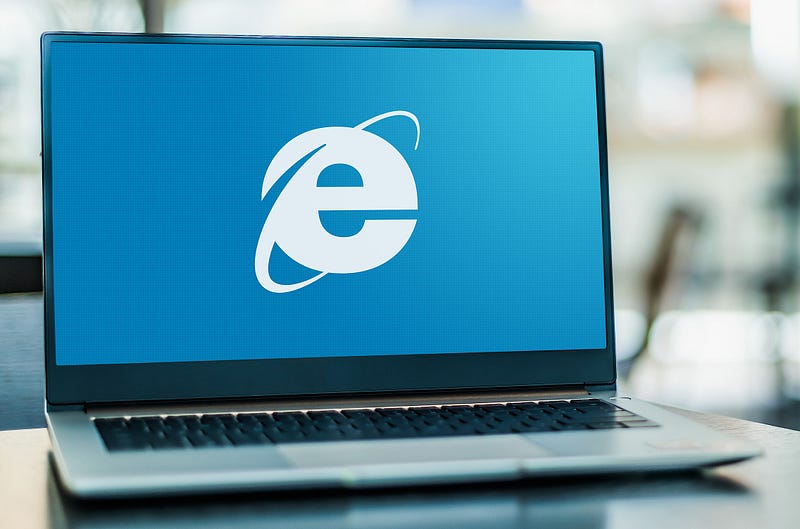The Rise and Fall of Internet Explorer: A Browser's Journey
Written on
The Evolution of the Internet
On June 15, 2022, Microsoft announced the discontinuation of Internet Explorer (IE). While this news may not stir much excitement among users of Chrome, Firefox, or Safari, its historical relevance is significant. For a span of 15 years, IE was the dominant player in the web browser market.
What Led to the Development of the Web?
The internet's inception can be traced back to Cold War tensions. Concerned about potential attacks on its telecommunications, the U.S. government sought alternative communication systems through the Advanced Research Projects Agency (ARPA) of the Department of Defense. In 1962, ARPA, with MIT's support, began conceptualizing a “galactic network” enabling computers to communicate. This effort culminated in the creation of ARPAnet, which sent its first message in 1969.
The introduction of the "Transmission Control Protocol" (TCP) was pivotal, allowing any networked computer to communicate with any other. This was later paired with "Internet Protocol" (IP) to form TCP/IP, laying the groundwork for the internet as a global network. Throughout the 1970s and 1980s, researchers and scientists utilized the internet, although commercial use was initially prohibited.
The commercial potential of the internet began to take shape in 1984 when CompuServe launched an online “electronic shopping mall.” However, it wasn’t until 1991, with Tim Berners-Lee's contributions, that the World Wide Web truly emerged, creating the modern internet landscape. The U.S. Congress officially recognized the internet for public and commercial use in 1992 through the Scientific and Advanced-Technology Act.
The Browser Wars Begin
In 1992, a group of researchers at the University of Illinois developed a web browser called Mosaic. Jim Clark and Marc Andreessen later commercialized it, founding Mosaic Communications Corporation and launching the renamed "Netscape Navigator" in late 1994. Internally, the project was dubbed “Mozilla,” reflecting its goal to surpass Mosaic.
By early 1995, Netscape Navigator had already captured a significant share of the browser market. Realizing it was falling behind in the internet arena, Microsoft hastily created its own browser.

To expedite its entry into the market, Microsoft bundled IE with Windows 95. The browser was based on a commercial version of Mosaic developed by Spyglass, which licensed the software to Microsoft. However, Microsoft later decided to distribute IE for free with Windows 95, effectively cutting Spyglass out of potential revenue—this was the first of several controversial practices.
In 1995, Microsoft attempted to pressure Netscape during a meeting, with Netscape’s then-CEO James Barksdale recalling, “I had never been in a meeting in my 33-year business career in which a competitor had so blatantly implied that we should either stop competing with it or the competitor would kill us.”
Browser War Dynamics
Despite the many technical advantages of Netscape Navigator, IE's free availability ensured its dominance. Microsoft leveraged its stronghold over PC operating systems to promote IE aggressively, effectively sidelining competitors like Netscape.
According to Steven Vaughan-Nichols from ZDNet, Microsoft’s strategy was to coerce PC manufacturers into bundling its operating system and browser, with the primary aim of eliminating Netscape from the market. This aggressive maneuvering drew the attention of the U.S. Department of Justice, which, alongside twenty states, accused Microsoft of monopolistic practices. In 2000, the court found Microsoft guilty of abusing its market position, though the company ultimately avoided a drastic breakup.
Despite legal challenges, Netscape struggled to regain its footing and was acquired by America Online (AOL) in 1999. By late 2007, IE held over 77 percent of the browser market, while Netscape Navigator was nearly obsolete.
The Rise of Competitors
As Netscape Navigator faded from the scene, Google launched Chrome in 2008, offering cross-platform capabilities that quickly dethroned IE. By 2012, Chrome emerged as the world's most popular browser, marking a significant shift in market leadership.
Microsoft has since transitioned to Microsoft Edge as its default browser. Sean Lyndersay, the general manager for Edge Enterprise, announced that Internet Explorer will eventually redirect users to Edge, signaling the end of an era.
This video delves into the rivalry between Microsoft and Netscape during the early days of the internet browser wars, showcasing how competition shaped the digital landscape.
This video covers the recent developments in the Microsoft Activision deal and its implications for cloud gaming, revealing how Microsoft's strategies continue to evolve.
Conclusion
Although Microsoft once held a commanding lead in the web browser market, its position has drastically changed in recent years. The company's shift towards Edge marks a new chapter in its internet journey, illustrating the ever-evolving nature of technology and competition.